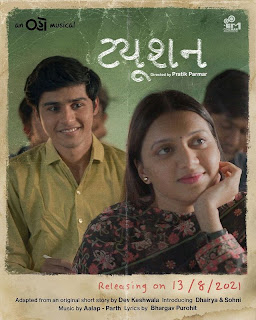I watched a Gujarati web series and it reignited my love for nostalgia. Gujarat is a culturally rich land with distinct folk art and literary heritage, and of course, it is a gold mine for storytellers...
Talking about love, I just watched the Gujarati web series Tuition. I am not usually the one to be entranced by the romanticising of yesteryears, although I indulge in tastefully crafted works of nostalgia sometimes. Also, because works on nostalgia are essential as our procedural memory is slowly blurring our ability to recollect the distant past. Or perhaps, our routine doesn't allow us the space to sit back, recollect and smile at the follies of our younger selves.
 |
| Source: IMDB |
Tuition by Pratik Parmar is a heart-warming trip down memory lane, a definitive visual treat for the 90s kids from Gujarat and mostly from northern India. Each frame, moment in the classroom, or the casual exchanges among friends made my heart leap with joy. Those who think that Gujarat doesn’t offer many picturesque meadows should watch it, as the crew has presented the majestic Girnar hills and the pristine mornings in Junagadh with sublime beauty. Each place and character beam with the contentment of a life resigned to simple tasks, conversations, and ruminations.
The lyricism and the simplicity of the story set in 1998 are heightened by break-taking photography and soul-stirring music. All my life I have only read about Girnar, Tuition has shown the fortitude and serenity of the hill in the most alluring way. I possess no desire to get into the prognostics of the plot or what transpires between the teenagers, instead, I offer a slice of life from my experiences as a school-tuition going kid in the early 2000s.
MY TUITION DAYS
Warm dusty summer mornings, some years ago, were times when I woke up and got ready to take on the day. Back then, there were no smartphones to schedule meetings or hatch plans with friends, all we held close were our hopes. The hope of waking up on time, having a hot breakfast to the heart's content, or hopes of evading traffic cops since most of us were driving without a driver’s licence. It was a time much before metro rail and cab-hailing applications got onto our palms. What a profound joy it was to get ready and hop on bicycles to ride it with an infectious abandon. Those were the years of liberation.
 |
| Source: IMDB |
A 20-min bicycle ride took us to our tuition centre, a place which was almost school with no uniforms as the only discerning character. Teachers were more at ease unlike their counterparts at school who took the individual onus of each wide-eyed pupil. If hurling chalks and dusters were a sport, I am confident that the teachers at my nondescript tuition centre had several Olympic gold medals in their closets. Also, classroom humiliation and caning were a part of the daily routine.
There were casual banters with students; some noisy ones often broke into a sleazy commentary in the middle of the sessions stirring the entire classroom. More or less all the teachers had a predictable disposition; they all made the same snide remarks at underprepared boys, girls getting late to class, or over anything that they deemed as an anomaly in their regimental routine.
Of course, all of us had a favourite teacher; it was a funny man who taught us accounts. I struggled with accounts, but his lectures with role-playing and humorous anecdotes made learning accounts sufferable. The steamy samosas and coca-cola at a fancy store below the tuition centre were a staple for most of us who had to sit for hours at a go. Another peculiar habit we enjoyed was waiting outside after the classes, sitting on our bicycles and scooters chit-chatting mostly poring over what went wrong in the test or girls.
THE PRICELESS MOMENTS
I always disliked the coaching centres; it always felt like attending two different schools on the same day. How could another school make any difference if the first one never got me interested in academics? However, most of my recollection of higher secondary school and tuition has been the experiential bliss, the comings, and the goings. I still recall the simple pleasure of moving around carefree on my bicycle and later on my father's old cranky Bajaj Super teal scooter. Like most adolescents, I too felt many things. Confusion and chaos prevailed yet there was so much harmony in being with friends, home-cooked meals, sibling rivalry, and of course the sweet pangs of unrequited love.
Watching Tuition brought back memories of my childhood; it transported me to being that shy yet occasionally boisterous youth. My days were spent balancing school, tuition, and home, the anxiety over exams, and if I could meet the expectations of my relatives, neighbours, and everyone else except my generous and loving parents.
Tuition is the screen adaption of a short story by famed writer Dev Keshwala. Interestingly, it is just the tip of the iceberg; there are thousands of aspiring writers, storytellers, and stories waiting to be told from Gujarat. The literary heritage of Gujarat is rich and it is heartening to see so many stories being told via OTT, I hope Gujarati plays, books, and poems continue to inspire more filmmakers.















